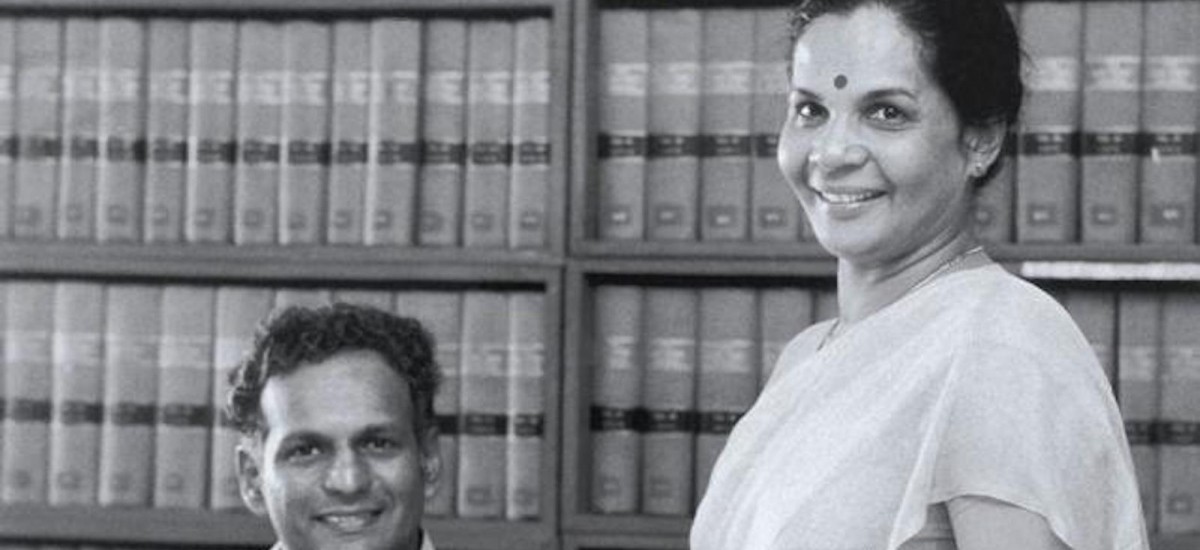Photo courtesy The Hindu
Writing a tribute to Sithie Tiruchelvam is not an easy task. Sithie was an intensely private person who was averse to public, over-the-top displays of emotion and sentimentality. I am aware that a piece that says little about her private persona could sound impersonal, even clinical. I have therefore attempted to pay fitting tribute, not only to her public achievements but also elements of her personality that are remembered and missed, in a manner that respects the privacy she cherished.
The ‘wife of Neelan Tiruchelvam’ is a phrase that has been frequently used to describe Sithie since she passed away on 22 March 2014. However, to those who knew Sithie she was never merely ‘the wife’. Sithie was a spirited, strong woman who did not mince words and was not afraid to speak her mind. Sithie showed great affection and generosity towards those she cared about and has supported and encouraged young people in numerous ways, most importantly by introducing them to those who would be able to inspire and mentor them. Making connections between people with varying interests and from different generations and disciplines, sometimes thinking of common areas of possible collaboration one would never have imagined, was something that came naturally to her. Sithie was one of the first people most of us thought of and turned to when we required legal advice, and we gravitated towards her during times of crisis as her common sense and unflappable nature gave comfort and instilled confidence. The intractable nature of a problem never deterred Sithie from providing assistance or advice when called upon, which was demonstrated by the unwavering and vital support she provided during very trying times to the institutions Neelan founded.
My introduction to Neelan and the institutions on Kynsey Terrace which fundamentally shaped not only my professional life but also my perceptions and view of the world was solely due to Sithie. Sithie and my mother were balcony mates (my mother’s phrase) at Peradeniya. In 1998 a chance meeting between my mother and Sithie at a supermarket resulted in Sithie not surprisingly, since she like Neelan always encouraged young people to explore the world of ideas and care about and contribute to social change, suggesting I meet Neelan to see if there were work opportunities at one of the institutions he founded. Thence began my long association with Kynsey Terrace.
After Neelan’s death Sithie wanted to further the values Neelan worked for during his lifetime, and realized that an indigenous grant-making organization could make meaningful contributions to address existing gaps in responding to the needs of communities. This belief led her to establish the Neelan Tiruchelvam Trust, an indigenous organization rooted within the community that has supported catalysts for social change by focusing on community initiatives. After the Trust was established Sithie dedicated considerable time and energy towards creating an organization that was more than a grant-maker. Sithie was very passionate about the work of the Trust and held it to exacting standards. At the same time she also took great pride in the achievements of the institution. The Trust’s foray into the global philanthropic sector is entirely due to Sithie whose efforts led to the Trust becoming a founding member of the Foundations for Peace, a network of indigenous foundations. I consider being invited by Sithie to become a trustee a privilege as it allowed me to be a part of efforts to further the values Neelan held dear.
One of the more colourful aspects of Sithie’s personality was her refusal to be impressed by exaggerated political correctness which she would subversively counter through her impish and irreverent sense of humour. Sithie didn’t believe in denying unpleasant truths for the sake of convenience or social niceties, and hence because of her inherent ability to strip away the layers of denial, fear or plain silliness that often prevented us from acknowledging and addressing the core of a problem, whether personal or professional, functioned as a reality check for many of us.
Over the years Sithie and I became friends and it was during the many hours spent in the study at her home I learnt the histories of the institutions Neelan founded and the characters that passed through them. I also learnt more about Neelan, his political involvements and interventions, and the kind of socio-political history you don’t find in books. Needless to say, Sithie’s narratives of alternate histories of political personalities and moments were always lively and would often make us double over with laughter.
Of course, throughout our relationship Sithie and I also had numerous disagreements and bitter arguments, which in large part was due to certain personality traits we shared as we were both quite strong willed (I can hear the disbelieving laughter of friends at my use of the word ‘quite’), had no qualms about being brutally honest and were not afraid of a good fight. Our friendship survived these verbal battles, even the extremely spirited ones.
During the past week I have been receiving messages from our friends from the global philanthropic sector, particularly those from the Foundations for Peace Network who remember her love of life, indomitable spirit and strength, and her commitment to supporting social justice initiatives. Sithie’s generosity, courage and tenacity are what I admired most about her. She was a tough cookie, who lived with dignity and fought the good fight until the very end.

